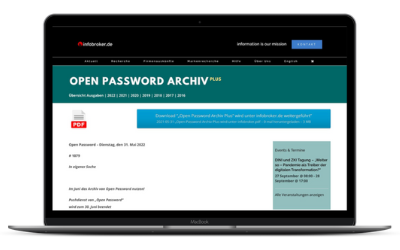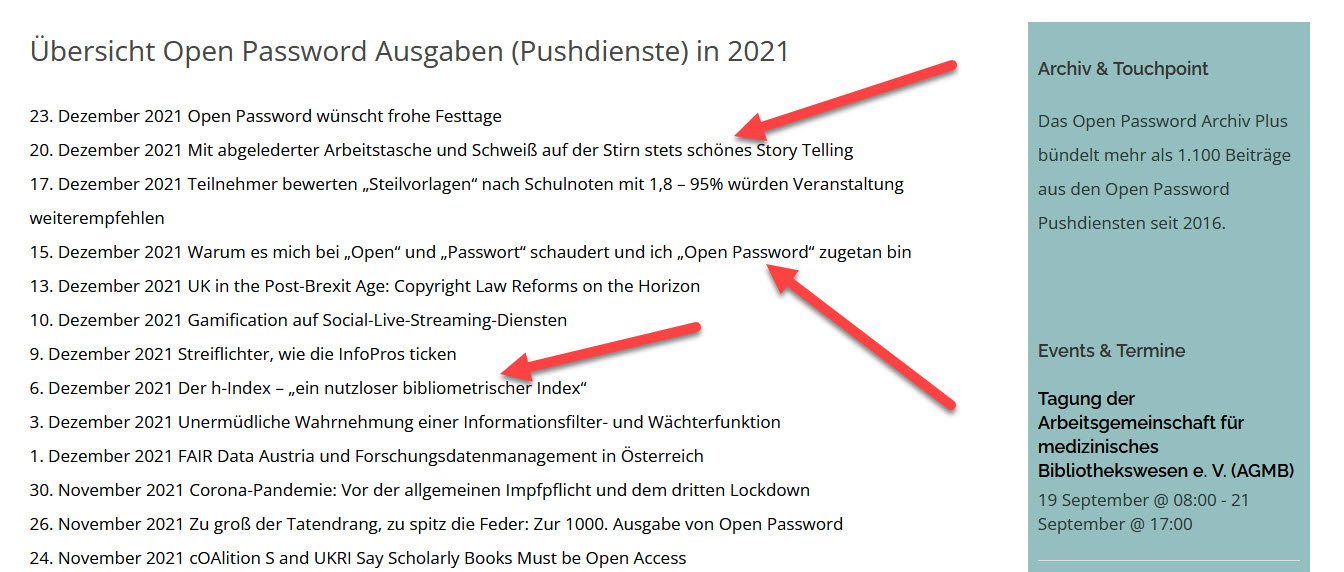Open Password – Freitag, den 29. Oktober 2021
# 992
Outsell – Research Seminars – Julia Kostova – Cassyni – Andrew Preston – Publons – Ben Kaube – Newsflo – Peter Vincent – Kopernio – Freddie Witherden – Jan Reichelt – Research Lectures – COVID-19 – Machine Learning – DOIs – CrossRef – Workflow Tools – Publishers – Partnerships with Societies – Global Research Community – Scholarly Communication – Academia.edu – Research Square – Events Management Tool – Zoom Fatigue – Delta Variant – Shift to Video – Video Content.
Herbert von Halem – Stephan Russ-Mohl – Christian Peter Hoffmann – Öffentlicher Diskurs – Liberalismus und Liberalität – Berichterstattung der Medien – De Gruyter – Deutschsprachiges Judentum – Faktenkontor – PR-Blogs – Mediengau – PR-Doktorin – Relevanzindex
- Titelgeschichte
Founders of Mendeley, Publons, and Kopernio Now Targeting Research Seminars –
By Julia Kostova
Neu erschienen: Zur Rettung des öffentlichen Diskurses
III.
De Gruyter: Deutschsprachiges Judentum online
IV.
PR-Blogs: Team Lewis vor Mediengau und PR-Doktorin
Outsell´s October Contribution
Founders of Mendeley, Publons, and Kopernio
Now Targeting Research Seminars
By Julia Kostova – VP & Lead Analyst
Julia Kostova
Cassyni taps into the hitherto ignored territory of the research seminar, bringing networked services to unrecognized — yet critical — venues for the exchange of knowledge.
_____________________________________________________
What to Know and Why It Matters
_____________________________________________________
A group of veteran entrepreneurs in scholarly communications technology acting as a first angel investor — Andrew Preston (Publons), Ben Kaube (Newsflo and Kopernio), Peter Vincent (Kopernio), Freddie Witherden (Newsflo and Kopernio) and Jan Reichelt (Mendeley and Kopernio) — recently announced the launch of Cassyni. Cassyni is a platform designed to organize and discover academic seminars and to facilitate the exchange of research through them.
The rationale for Cassyni is compelling: Academic seminars and research lectures — distinct from small conferences — are a critical forum for disseminating ideas and fostering research collaboration. In the past, these largely existed as in-person events. The COVID-19 pandemic forced many of them to migrate to video-conferencing platforms that didn’t always lend themselves to the bespoke needs of the research community.
Cassyni proposes to formalize and centralize the seminar space with a multi-pronged platform solution:
- It provides a suite of integrated workflow tools to seminar organizers, from scheduling tools to invitations to attendance management and licensing agreements.
- It applies machine learning to automatically extract useful keywords to tag content, and, in the future, transcribe questions and discussions.
- It includes features like the ability to join communities of interest, discussion sessions, in-depth research profiles, and synchronous and asynchronous seminar viewing.
- It creates a lasting record by assigning DOIs to each seminar and depositing them in CrossRef to make them discoverable.
Cassyni seminars are free for attendees and speakers; organizers pay a fee and can choose from several individual and group subscription plans based on the volume of seminars. Pricing is transparent and relatively inexpensive in the context of seminar travel budgets, ranging from $30 to $130 a month.
_____________________________________________________
Analyst Rating: Positive
_____________________________________________________
Cassyni’s real value-add lies in offering incremental gains through an aggregation of well targeted and integrated features — like attendance management, scheduling tools, and social networking — that have until now been scattered across different platforms. The value of such a workflow tool can hardly be overstated against the backdrop of the ballooning admin and tech burden on the research community.
To a large degree, scholarly communications tech projects are only as good as their platforms. In this respect, Cassyni hits the nail on the head: It is genuinely intuitive and automated in logical places and provides often-elusive seamlessness. Using technology efficiently is key to Cassyni’s scalability. The platform has a pronounced social dimension to it, intentionally designed to foster virtual scientific communities. Importantly, Cassyni provides a way to organize the seminar space, which, the founders estimate, likely consists of millions of seminars annually. Cassyni also allows seminars to be listed on the platform even if they are not run through Cassyni.
Seminars and lectures are largely funded by departments and/or institutions, and Cassyni taps into these existing budgets, which will encourage uptake. Its flexible and relatively affordable package plans also support broader uptake.
Cassyni is a platform that will lend itself nicely to a variety of applications, and that’s where we see strong potential. Institutions looking to amplify their brands by showcasing research are already taking advantage, as are journals and publishers eager to attract new readers and authors.
Similarly, publishers large and small looking to increase engagement with their publications, in all content and format types, can benefit from incorporating this tool into their publishing, educational, and membership programs. We also see potential in partnerships with societies that are eager to bolster their member communities and maintain engagement in a remote landscape, helping them to address the decline in perception of the value of society membership.
_____________________________________________________
Winners and Losers
_____________________________________________________
One clear winner is the global research community, whose needs Cassyni has considered in creating its platform. Cassyni is mining an area of scholarly communications that has been largely ignored until now, so it doesn’t so much disrupt the existing landscape as open up new possibilities for services around the scholarly seminar.
However, it potentially challenges players in different corners of the field who may offer similar services, albeit applied to different contexts. For instance, Cassyni’s community focus could encroach on academic networking companies like Academia.edu. It also enters an increasingly dense space of services aiming to increase the impact of research, like Kudos or Research Square, the latter of which integrates video in its service offerings.
It’s interesting also to consider Cassyni as an events management tool in the continuously disrupted conference circuit. While it doesn’t directly compete with companies providing virtual conference workflow solutions (e.g., Underline Science, Open Water, and Morressier), it may do so in the future. That’s particularly the case if large virtual events are supplanted by smaller, focused series of presentations, as we’ve seen many scale down to fight Zoom fatigue and maintain delegate engagement.
_____________________________________________________
What’s Next
_____________________________________________________
With the Delta variant continuing to hinder in-person meetings and instruction, a dedicated, organized platform for recording and publishing seminars can help solve real-life challenges for researchers. Like other companies and projects that have sprung up to capture, legitimize, and monetize ancillary scholarly communication materials and events, Cassyni also highlights the fact that much of research communication happens outside haloed venues like journals and major conferences and provides an accessible platform for the exchange of scholarly ideas. We also see considerable potential for Cassyni to amplify the shift to video as a vehicle for communication within scholarly communications.
In the short term, success for Cassyni will come from scale, not necessarily from additional features in its already intuitive platform. Even with the hope for a “return” to in-person meetings, we believe that the virtual component for meetings will outlast the pandemic. In the case of seminars, like that of meetings, organizers are keen to keep the new audiences they can reach virtually, and Cassyni provides a good solution.
Monetizing the workflow tool is likely to be easily achievable, first, because of the value it adds, and second, because it taps into existing departmental budgets. In the longterm, to augment its product, Cassyni would benefit from exploring new use cases and partnerships with academic institutions, learned societies, and publishers as well as the advanced scientific pedagogical potential of the platform.
_____________________________________________________
Essential Actions
_____________________________________________________
We expect that new digital networked solutions will continue to emerge to meet the unmet needs of the researcher. Outsell’s essential actions for providers addressing these markets include the following.
Focus on Researchers’ Needs. Stakeholders in the scholarly communications field should continue to explore new ways of supporting solutions that underpin research communication, augmenting them with time- and labor-saving technological tools and workflows as well as networking features. Given the glut of solutions and tools available, the holy grail is moving beyond disjointed tools to platforms with seamless integration across the research journey. The need is maturing for platforms supporting scientific collaboration.
Explore Video. With the shift to virtual in 2020, the research community suddenly created an enormous amount of video content that is ripe for structuring. As research moves to a multimodal model, opportunities for integrating video in the research journey are ripe.
Neu erschienen
Zur Rettung des öffentlichen Diskurses
Stephan Russ-Mohl/Christian Pieter Hoffmann (Hrsg.), Zerreißproben. Leitmedien, Liberalismus und Liberalität – Schriften zur Rettung des öffentlichen Diskurses, 2021, ISBN (Print) 978-3-86962-535-5, ISBN (PDF) 978-3-86962-538-6.
(Herbert von Halem) Wie steht es um Liberalismus und Liberalität im öffentlichen Diskurs? Liberale Werte werden öffentlich gefeiert – und vehement bekämpft. Sie stehen unter Druck und sind Zerreißproben unterworfen: Stichworte sind der Neoliberalismus, die Identitätspolitik, die Corona-Krise. Was wissen wir über das Verhältnis von Leitmedien, Liberalismus und Liberalität? Wie wird über liberale Anliegen oder Parteien berichtet? Wie sehen und empfinden Journalisten ihr Verhältnis zum Liberalismus – und die Liberalität des Berufsfelds?
Die Autoren klären, ob der Journalismus für mehr Freiheit Partei ergreifen könnte und sollte, und warum Liberalismus und „Neoliberalismus“ einen so schweren Stand in Redaktionsstuben haben.
De Gruyter
Deutschsprachiges Judentum online
(De Gruyter) Mit Blick auf das diesjährige Jubiläum „1.700 Jahre jüdisches Leben in Deutschland“ bingt De Gruyter Datenbank Archiv Bibliographia Judaica – Deutschsprachiges Judentum Online (ABJ Online) ans Herz legen.
Einst gegründet, um deutschsprachigen Jüdinnen und Juden nach dem Nationalsozialismus ihre Stimme zurückzugeben, dokumentiert das Archiv Bibliographia Judaica die biographischen Details von aktuell ca. 15.000 jüdisch-deutschen Persönlichkeiten aus 200 Jahren Literatur, Politik, Wissenschaft und Kunst; weitere 5.000 Einträge folgen 2022. 250.000 verknüpfte Scans präsentieren die Orginal-Karteikarten ihrer Werke.
PR-Blogs
Team Lewis vor Mediengau und PR-Doktorin
(Faktenkontor) Auch Pressesprecher, Markenexperten und PR-Berater informieren sich auf Blogs gern zu den Neuigkeiten aus der Marketing- und Medienwelt. Besonders viele nutzen dafür den Blog der global agierenden Agentur Team Lewis. Dort geht es um Soziale Medien, authentisch kommunizierte Nachhaltigkeit und Werbung in Videospielen. Der LEWIS Blog belegt den ersten Platz im von der Kommunikationsberatung Faktenkontor erhobenen Blogger-Relevanzindex, der einen Überblick über die Relevanz von 1.600 Blogs im deutschsprachigen Raum liefert. In diesem Fall wurden PR-Blogs auf ihre Sichtbarkeit im Internet, die Anzahl der Verlinkungen, Social-Media-Aktivitäten und Interaktionen mit der Community überprüft.
An zweiter Stelle steht der „Mediengau“ des Krisen-PR-Experten und geschäftsführenden Gesellschafter der Faktenkontor GmbH, Jörg Forthmann. Hier geht es um Kommunikationsfehler der Unternehmen und wer in den Medien gut oder schlecht wegkommt. Die sogenannte „PR-Doktorin“ Kerstin Hoffmann schafft es mit ihrem Blog auf den dritten Platz. Sie schreibt über Unternehmenskommunikation und Marketing im digitalen Wandel mit praktischen Tipps zu Zeitmanagementund rechtlichen Fallstricken. In den Top 25 der PR-Blogs finden sichzahlreiche unterschiedliche Aspekte für die Kommunikationsprofis – von der Tourismus-PR über die Erlebnisse von Trainees in der Unternehmenskommunikation bis zu Tipps für ein datenbasiertes Performance-Marketing.
Mehr unter www.Blogger-Relevanzindex.de.
Open Password
Forum und Nachrichten
für die Informationsbranche
im deutschsprachigen Raum
Neue Ausgaben von Open Password erscheinen dreimal in der Woche.
Wer den E-Mai-Service kostenfrei abonnieren möchte – bitte unter www.password-online.de eintragen.
Die aktuelle Ausgabe von Open Password ist unmittelbar nach ihrem Erscheinen im Web abzurufen. www.password-online.de/archiv. Das gilt auch für alle früher erschienenen Ausgaben.
International Co-operation Partner:
Outsell (London)
Business Industry Information Association/BIIA (Hongkong)
Anzeige

FAQ + Hilfe



